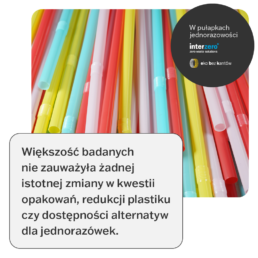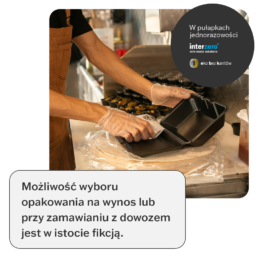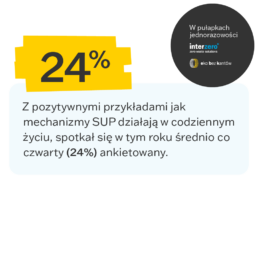The SUP Directive, or a half-whistle revolution
Despite the fact that the provisions of the SUP Directive have been in place in Poland for more than a year and a half, the majority of Poles have not noticed any significant change in terms of packaging, plastic reduction or the availability of alternatives to disposables, according to the latest data presented in the first part of the 'In the Traps of Disposability' report, entitled 'The Curse of Single-Use Plastic', produced by Interzero.
The revolution has passed and hardly anyone has noticed - this is how, in a few soldierly words, one could summarise the effects of the so-called Single-Use Plastic Act (hereafter also: 'SUP Act' - from Single-Use Plastic) coming into force. Only 13 per cent of respondents, declared that they knew what the SUP Directive waswhat its objectives are, and what tools will be used to achieve them.
However, it is not the awareness of Poles per se that is the issue, but the low effectiveness of the mechanisms implemented in Poland that were supposed to encourage waste prevention and product reuse. One of these is the imposition of an additional charge on plastic packaging, in force since 1 January 2024, which was supposed to - like in the case of advertising bags, for which we have been paying for several years - encourage us to use reusable packaging for drinks and food.
The snag, That 42 per cent of respondents never even noticed these additional charges. In contrast, as much as 56 per cent systematically ignore them because they are usually low enough in relation to the amount on the receipt (on average a few tens of pennies, the most being around PLN 2 per item) that they do not encourage people to give up the convenience that the vast majority of respondents see in disposable packaging. "You don't have to wash them, return them to any point or return them to a restaurant, or carry them with you in case of spontaneous decisions to order a takeaway meal," respondents also pointed out during in-depth focus research conducted independently by Opinia24.


Multiple use - still little incentive
Unfortunately, it is also a fiction from the respondents' perspective to offer an alternative type of packaging in catering establishments. It appears that this obligation is implemented more in theory than in practice - the The vast majority of respondents (79 per cent) have never encountered the option of choosing different, more environmentally friendly packaging in a restaurant or when ordering takeaway. Only one in four consumers has ever encountered information about the legally guaranteed (just under the SUP Directive) reusable packaging alternative.
This was directly confirmed by the respondents themselves - "Only choice about cutlery, whether you want extra plastic. That's the only choice I have in the application. When I come and take away, nobody asks me either. Alternatively, whether to give a net or take in my hand," said one qualitative research participant.
- "Usually there is no such option, it is just one option available at a particular place. For example, the 'Chinese' has their containers, the pizzeria has their pizza boxes and no one asks if we want anything else. I have not encountered a choice," echoed the other.
- "[...] I will say frankly that since 1 July, I have ordered many times, more than 15 times or more, and no one either in the premises or on the phone has offered me anything like that," - indicated another respondent.
What does discarded packaging say about us?
In the first part of the report 'In the traps of reusability', entitled 'The curse of single-use plastic', we also read a lot about the eating habits of Poles: what they order most often, where and how they order (by phone, app, in person), what they pay attention to when they look at the packaging they are offered, and what they think about reusable packaging.
And these are just some of the findings from the qualitative and quantitative research to help diagnose and describe the state of implementation of the single-use plastics directive in Poland. The qualitative research involved interviews with 24 people, the quantitative CAWI research was conducted on a nationwide representative sample of 1,000 people. You can read the entire publication here: https://ekobezkantow.pl/raporty/w-pulapkach-jednorazowosci/

About Eco without the corners
In 'Eco without the squiggles', we talk about ecology without bending the truth. We deal with myths, fake news and half-truths. Our aim is to explain why waste should be separated, not just how to do it properly.
"Eco without a corner" was born out of the belief that in a world full of misinformation and greenwashing, a reliable source of accurate information is needed. We cover topics such as sustainability, recycling, GOZ and legislation related to waste management. We discuss the environmental impact of packaging, batteries and electro-waste, as well as how to reuse them as valuable resources.
